How To Order Custom Pins for Your Brand
Custom pins are a fantastic way to showcase your brand’s identity and create a lasting impression. Whether you’re looking to promote your business, raise awareness for a cause, or reward your loyal customers, custom pins offer a versatile and eye-catching solution. In this blog post, we will guide you through the process of ordering custom pins for your brand, ensuring a seamless and successful experience.
In this guide, we will explore the marketing benefits of selling custom pins as merch and break down the step-by-step process on how to design and order custom pins for your brand. You might be a small business owner, independent artist, or part of a larger company – whoever you are, this guide will teach you how to sell and order pins.
Low production costs
Custom pins are relatively inexpensive to produce compared to other merch items like t-shirts or hats. This means you can sell them at a higher price point and still make a good profit.
High demand
Whether it’s branding, social identification, commemoration, political campaigns or personalized needs, custom badges can meet a variety of needs and become a popular custom gift and promotional tool.
Brand awareness
Custom pins are walking advertisements for your brand. When someone wears your pin, they are essentially promoting your brand to others.You can order pins with logo designs or slogans that represent your brand, allowing you to increase your visibility.
Versatility
Pins can be attached to clothing, bags, hats, or even displayed as a collectible item. This versatility makes them attractive to a broad range of customers.
Types of custom pins
Before you design and order pins, you need to familiarize yourself with the different types of pins and manufacturing processes. When most people think of pins, they picture enamel pins, which are the most common type. However, there are other options available, which we explain below.
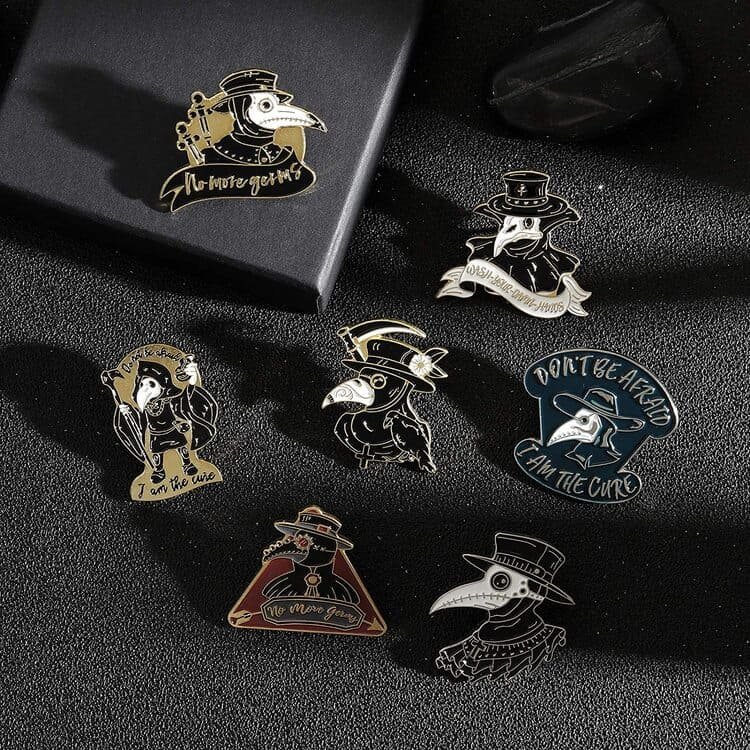
Custom metal pins
Custom metal pins are made from a variety of metals, such as brass, copper, iron, zinc alloy, or stainless steel. They are one of the most durable types of custom pins and can withstand wear and tear. You can create these pins in different shapes, sizes, and finishes depending on your preferences.
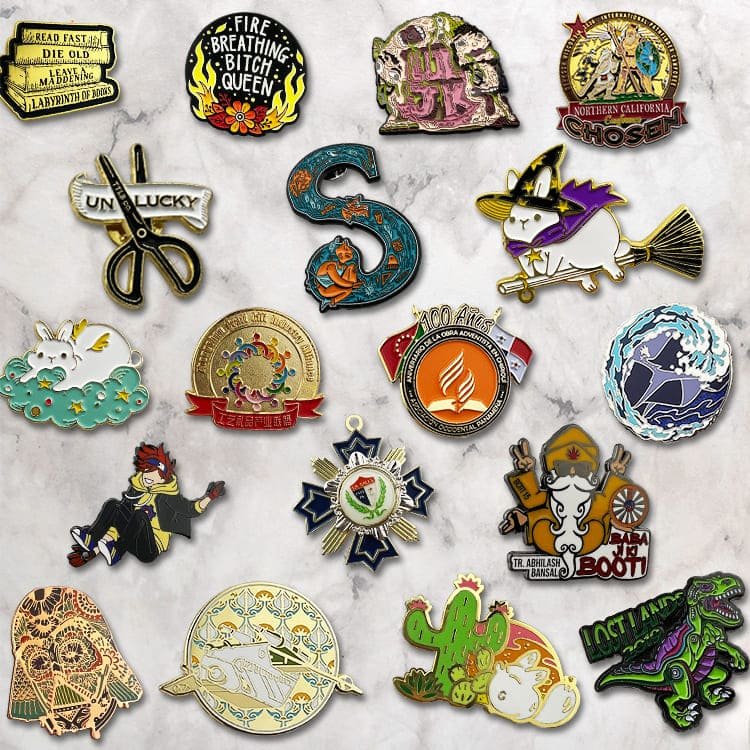
Custom enamel pins
Enamel pins are made by filling in the recessed areas of a metal pin with colored enamel paint. This process creates a smooth and glossy finish, making them popular among collectors. If you decide you want to order custom enamel pins, then keep in mind there are two types:
- Soft enamel pins. Soft enamel pins are created by filling in the recessed areas of a metal pin with enamel paint, which is then baked at a high temperature. This process allows the enamel to sink below the raised metal lines, creating a textured feel. They’re the most common type of custom pin.
- Hard enamel pins. Hard enamel pins have a more polished finish and the creation process is different too. Pieces of enamel are melted and baked together on top of the metal pin, creating a smooth and even surface. These pins are slightly more expensive
Custom die struck pins
Die struck pins are made using a process where a custom-designed mold, called a die, is used to stamp the pin design onto a metal surface.These pins have no color and rely on different metal finishes, such as polished gold, silver, or copper to create contrast and highlight the design.
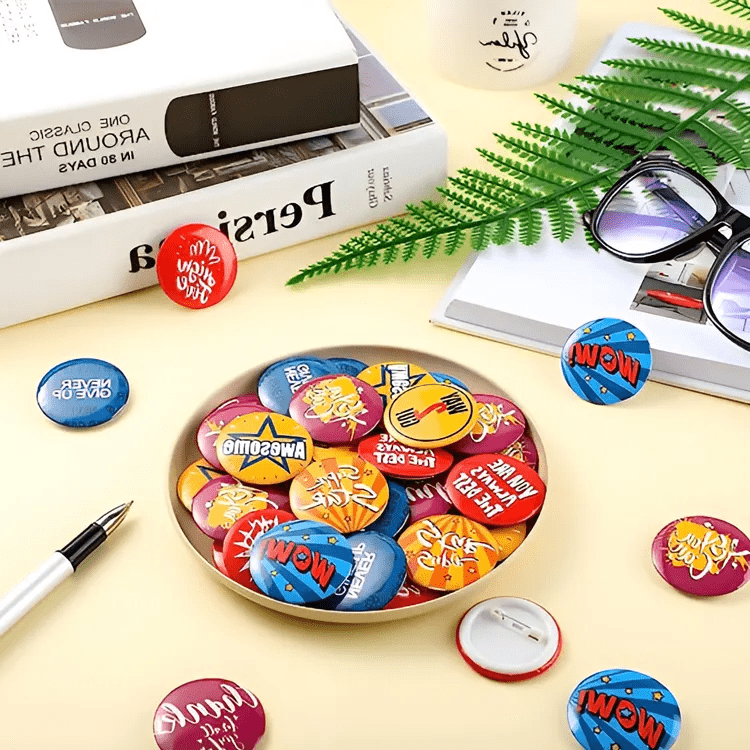
Custom epoxy pins
Custom epoxy pins, also known as epoxy dome pins or epoxy coated pins, are a type of lapel pin that features a protective epoxy coating on top of the pin design. This coating is applied in liquid form and hardens into a clear, domed shape, creating a smooth and glossy surface.
Types of accessories
Custom pins come with various backing attachments to keep them securely in place. Some popular options include:
- Butterfly clutch. A metal piece with two small prongs that are squeezed together to secure the pin.
- Rubber clutch. Similar to a butterfly clutch but made of rubber, making it more durable and less likely to fall off or lose its grip.
- Magnetic backing. Strong magnets are used to attach the pin to clothing without causing any holes or damage.
- Safety pin. A classic option that provides a secure hold and is easy to put on and take off.
- Bent legs. This backing allows the pin to be attached to buttons by bending two metal legs on the back of the pin.
Pins for different occasions
When designing pins for different occasions, consider incorporating relevant symbols, colors, and themes that align with the purpose and significance of the event. Customizing pins adds a personal touch and creates a lasting keepsake for participants, supporters, or attendees.
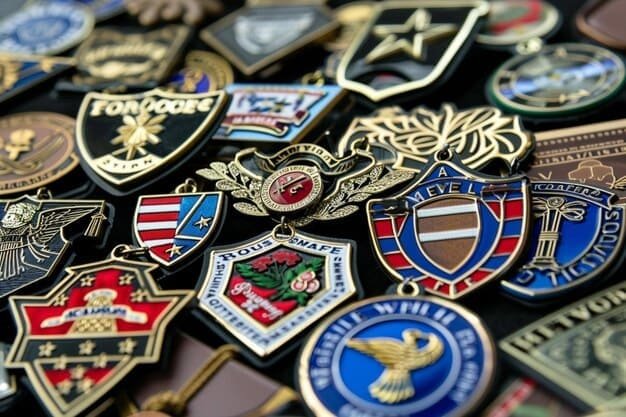
Military pins
Military pins may vary depending on the country and branch of the military. Military pins serve as symbols of honor, achievement, and identity within the military community, and they hold deep significance for those who wear and collect them.
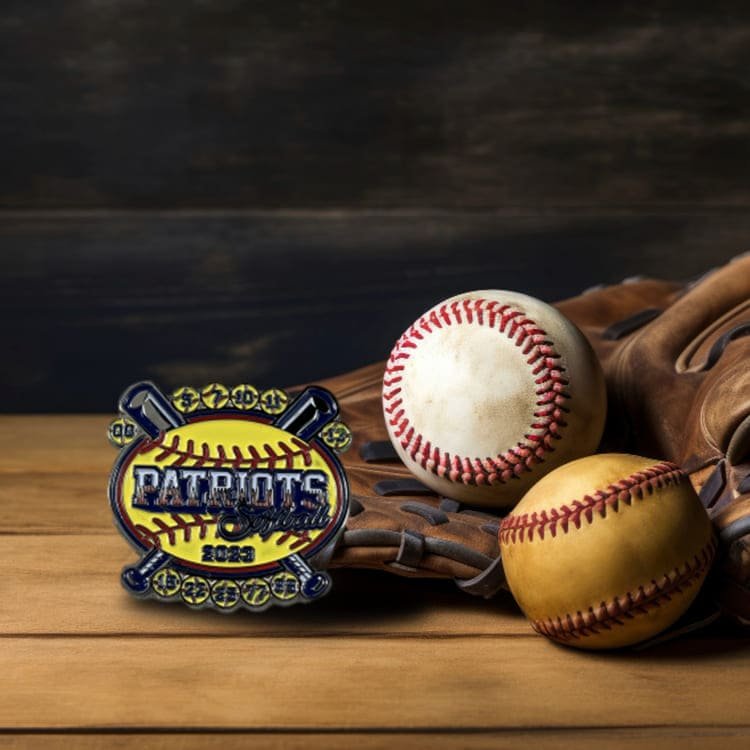
Sports pins
Sport pins are popular collectibles and symbols of pride and achievement within the world of sports. They are commonly used to commemorate sporting events, acknowledge participation, and showcase team spirit.
Company pins
Company pins, also known as corporate pins or company logo pins, are custom-designed pins used by businesses and organizations for various purposes, including brand promotion, employee recognition, corporate events, and marketing campaigns.
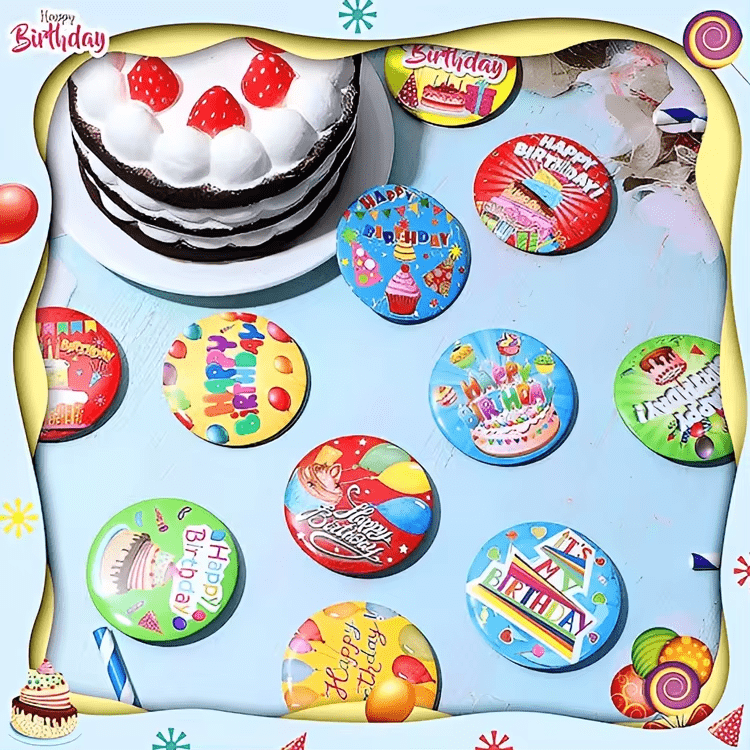
Event pins
Event pins, also known as commemorative pins or collectible pins, are custom-designed pins created specifically for events, festivals, conferences, or special occasions. These pins serve as mementos, souvenirs, or symbols of participation in the event.
How to order custom pins
Now that you’ve finalized your design and have a clear vision for the type of pins you want, it’s time to proceed with ordering custom pins. Here’s a step-by-step guide to assist you through the process:
Determine your budget
Before proceeding with ordering custom pins, it is crucial to determine your budget. Assess the financial resources available for the project and set a realistic spending limit. Consider factors such as the quantity of pins required, the complexity of the design, and any additional customization options you desire.
Some common cost factors to think about:
- Pin size. Larger pins often cost more than smaller ones due to the amount of material and labor required.
- Materials. The type of material used can impact the cost. For example, hard enamel pins tend to be more expensive than soft enamel pins.
- Quantity. Most manufacturers offer bulk discounts, so the more you order, the lower the cost per pin will be. However, keep in mind that ordering pins in large quantities may result in a bigger upfront cost or you could end up with excess stock. You might want to look for a manufacturer with low minimum order quantity requirements (like us at Unique Pin!).
It’s also worth considering any additional costs that may arise, such as shipping fees, marketing expenses, or the cost of packaging your pins. It may also be helpful to add in a buffer for unexpected costs!
Choose the right manufacturer
There are many manufacturers out there that allow you to order custom pins of all kinds, but not every manufacturer is the same. It’s important to do some research and find a reputable company that can produce high-quality pins at a reasonable cost.
Some things to keep in mind when choosing a manufacturer include:
- Quality. Look for manufacturers with good reviews and a strong portfolio of previous work. You want to make sure the pins you receive will be of high quality and accurately represent your design.
- Cost. As we’ve mentioned, pins can vary quite a bit in cost, depending on what you’re looking for. Make sure to compare prices from different manufacturers to get the best deal.
- Production time. If you need your pins by a certain date, make sure to check the production time of each manufacturer. Some may take longer than others to produce and ship your order.
- Minimum order quantities. Some manufacturers require minimum orders for custom pins. Decide how many pins you need and find a manufacturer that can accommodate your order size.
Once you’ve done your research and found the right manufacturer for your custom pins, it’s time to move on to the next step.
Order custom pins
choosing the right manufacturer or supplier for your custom pins, you can proceed with placing your order. Here at Unique Pin, you can easily order custom pins with a simple 4-step process:
1. Select your size and quantity
You start by choosing how many pins you want to order. We offer discounts for higher order quantities.
2. Specify dimensions and pin type
Next, you’ll need to specify the dimensions of your pins and choose what type of material, backing, colors, and finish you want.
3. Upload your design
Now it’s time to upload your design file. Our team will review it and make sure it’s ready for production.
4. Choose your production speed
Finally, you can choose how quickly you need your pins. We offer standard production time as well as rush options for an additional fee. You can opt to skip the sample production phase if you’re in a hurry (but we do recommend getting a sample first).
5. Pay for your order
After completing all the steps and reviewing your order summary, it’s time to pay for your order. We accept various payment methods such as credit card, PayPal, and bank transfer.
Once you’ve placed your order, sit back and relax while our team gets to work on creating your custom pins.
Decide where you want to sell your pins
Online Platforms: Establish an online presence by selling your pins through various e-commerce platforms. Set up your own website with an online store or utilize popular third-party platforms such as Etsy, Shopify, or eBay. These platforms provide a wide reach and convenient shopping experience for customers.
Social Media: Leverage social media platforms like Instagram, Facebook, Twitter, or Pinterest to promote and sell your custom pins. Create engaging posts, share high-quality images, and interact with your followers to generate interest and drive sales. You can also explore social commerce features offered by these platforms to facilitate direct purchasing.
Local Events and Markets: Participate in local events, craft fairs, or markets that align with your target audience. Set up a booth or table to showcase and sell your custom pins directly to customers. These events offer opportunities for face-to-face interactions, building brand awareness, and gaining immediate feedback.
Collaboration with Retailers: Approach local boutiques, gift shops, or specialty stores that align with your pin’s theme or target market. Propose a collaboration or consignment arrangement where they can display and sell your pins in their physical store. This allows you to tap into their existing customer base and benefit from their established retail presence.
Wholesale Distribution: Consider wholesaling your custom pins to other businesses or resellers. Identify potential retailers, online stores, or distributors who might be interested in carrying your pins. Offer them wholesale pricing and establish mutually beneficial partnerships.
Custom Orders and Commissions: Explore the possibility of accepting custom orders or commissions for personalized pins. Market your ability to create unique designs based on individual requests. This can attract customers looking for one-of-a-kind pins for special occasions, organizations, or promotional purposes.
Collaborations and Influencer Marketing: Collaborate with influencers, bloggers, or content creators who have a relevant audience and reach. They can help promote your custom pins to their followers through sponsored posts, giveaways, or reviews, expanding your brand’s reach and driving sales.
Corporate or Organizational Sales: Approach businesses, clubs, or organizations that may be interested in purchasing your custom pins for their employees, members, or promotional purposes. Offer bulk pricing and customization options to cater to their specific needs.
Package and ship your pins
Gather Packaging Materials: Collect the necessary packaging materials such as small boxes, bubble mailers, padded envelopes, or pin display cards. Ensure they are sturdy enough to protect the pins during transit.
Protect the Pins: Place each pin in an individual protective plastic bag or wrap them with bubble wrap to prevent scratching or damage. This is especially important if your pins have delicate or intricate details.
Choose Packaging Method: Depending on the quantity and type of pins you’re shipping, decide on the appropriate packaging method. For small quantities, padded envelopes or bubble mailers may suffice, while larger orders may require small boxes or shipping boxes.
Add Branding and Inserts (Optional): Consider adding a personalized touch to your packaging by including branded inserts, thank-you notes, or business cards. This can enhance the unboxing experience and leave a positive impression on your customers.
Seal and Label the Package: Close and seal the packaging securely using tape or adhesive. Affix the shipping label prominently on the package, ensuring it is clear and legible. Include a return address label as well.
Choose a Shipping Carrier: Select a reputable shipping carrier that offers reliable service and competitive rates based on your needs. Popular options include USPS, UPS, FedEx, or DHL. Compare their services, pricing, and delivery times to find the best fit for your shipping requirements.
Calculate Shipping Costs: Determine the shipping costs based on the weight, dimensions, destination, and chosen shipping method. You can use online shipping calculators provided by the shipping carriers or consult with their representatives for accurate pricing information.
Schedule Pickup or Drop-off: Arrange for a pickup or drop-off of your packaged pins with the chosen shipping carrier. Some carriers offer scheduled pickups from your location, while others require you to drop off the packages at their nearby locations. Follow their instructions and timelines accordingly.
Track and Communicate: Keep track of the shipping progress by utilizing the tracking number provided by the shipping carrier. Share this tracking information with your customers to keep them informed about the status of their shipment.
Customer Service and Follow-up: Provide excellent customer service by promptly addressing any shipping-related inquiries or concerns from your customers. Follow up with them after the pins are delivered to ensure their satisfaction and encourage feedback or reviews.
Order Custom Pins from Unique Pin
Ready to order custom pins? Great! We’re ready to help you every step of the way. We have a broad range of pin options, from hard enamel pins and soft enamel pins to die-struck and epoxy. We even offer custom shapes and backing options.
Not quite sure what you want? Just explore our custom pin page for inspiration. You can also contact our team if you need some help with the design and ordering process.
Once you have your design finalized, simply place your order through our user-friendly ordering system. Looking forward to working with you!

